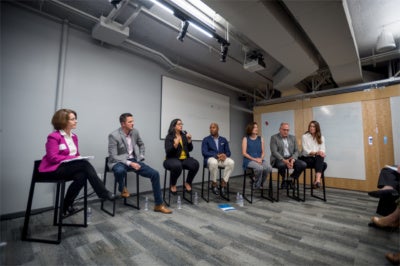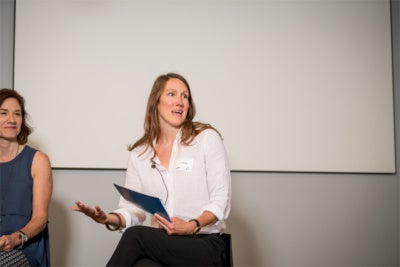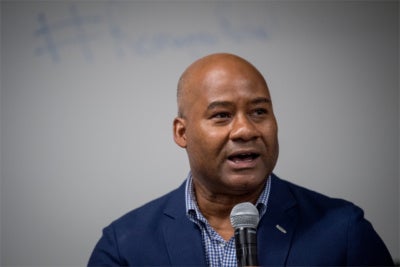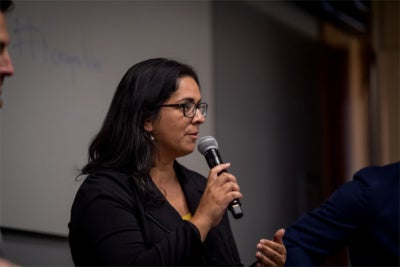Changes in technology and business norms are upending industries, creating both opportunity and anxiety for business leaders and workers. This is especially true in the retail industry, which employs nearly 16 million people in the US.
Through Reimagine Retail, the Economic Opportunities Program has been working with partners in six regions across the country to test innovative strategies to improve stability and mobility for retail workers.
To explore what the evolving retail landscape can teach us about job quality, the Economic Opportunities Program, in partnership with Reimagine Retail partner Pacific Community Ventures (PCV), recently hosted “What’s in Store? The Future of Retail Work(ers)” at the Google Community Space in San Francisco. At the event, workforce and economic development practitioners joined philanthropic leaders to discuss challenges facing retail workers and promising solutions that support economic mobility and small business success.
The Power of Partnerships

Left to right: Maureen Conway, Jose Gordon, Gayatri Agnew, Andre Oliver, Mary Jo Cook, Peter Callstrom, Jen Musty. Click to enlarge.
The event’s first panel brought together Peter Callstrom, president and CEO of the San Diego Workforce Partnership; Mary Jo Cook, president and CEO of PCV; and Jen Musty, owner of San Francisco-based Batter Bakery for a discussion of practical actions that can improve retail worker economic stability, mobility, and job satisfaction within the constraints of a small business operation. All agreed that partnerships between local workforce and economic development organizations can help more retail business leaders make the connection between job quality and business performance.
“Our experience is that the vast majority of business owners want to do right by workers, but they need information on where to start. They want to know ‘How do I go about creating good jobs? Where do I find the time? How do I get started?’” said Cook. “So, we asked ourselves how we can support the small business owners we work with in creating jobs that are good for workers and good for businesses.”
Through Reimagine Retail, PCV, which provides small business loans and free expert advice to businesses in underinvested areas, created the Good Jobs, Good Business toolkit. This step-by-step guide offers practical guidance and resources for business owners to improve on their employment practices with the goal of reducing turnover and improving business performance, while also improving workers’ overall satisfaction and engagement in their jobs.
Musty worked with PCV to pilot the toolkit at Batter Bakery, a local artisanal bakery that sells its products through a variety of channels, including a storefront, a kiosk, a farmers’ market, and online.
As part of Musty’s pilot, she invested in employee training and new employee engagement approaches that she credits with improving customer service, increasing employee retention, and yielding a $22,000 increase in quarterly sales. She also strengthened benefits and increased wages.
“Before we made these changes, we’d put a lot of resources into training someone, and then they’d leave,” Musty said. “To help keep turnover down, one of our big focuses is ensuring staff understand why I’m passionate about what we do and why they should be too.”
Like PCV, the San Diego Workforce Partnership – the workforce board for San Diego city and county – is also testing new ways to partner with retail businesses in a changing economy. Callstrom emphasized that the public workforce system must become increasingly innovative to support businesses and retail workers.
“We went through a full revisiting of our strategic plan to emphasize job quality,” said Callstrom. “We’re now working with retailers in a proactive way to help them understand the different components of job quality. When we can be thought leaders and ‘do leaders’ with others in our region, we can really make an impact.”
Technology and the Future
Adjusting to technology shifts was a theme of the event’s second panel, which brought together three leaders in philanthropy – Gayatri Agnew, senior director of Walmart.org; Jose Gordon, president of the eBay Foundation and chief of staff for communications at eBay; and Andre Oliver, senior program officer at The James Irvine Foundation – to discuss their approaches to supporting economic stability and mobility for workers and success for small businesses.
Jose Gordon described how eBay helps small businesses take advantage of the opportunities that new technologies can offer by providing technical expertise, tools that streamline transactions and payments, listing management, advertising, and other options to help small businesses grow. He noted that eBay’s technology platform is designed to empower entrepreneurs and small business owners, encourage the growth of an inclusive and fair marketplace, and provide access to both local and global markets, no matter a business owner’s location.
As a major global retailer, Walmart is rapidly integrating new technology into retail operations. Technology has automated some store-based tasks, which Agnew pointed out can open up new opportunities for workers. For example, Walmart is using robots to track inventory on the shelves, freeing associates to spend more time with customers. The retailer is also exploring the potential for innovations in big data to improve scheduling and in artificial intelligence to support new training experiences.
“The most compelling statistic we’ve looked at about the changing nature of work is that somewhere between 40-70% of tasks for the average worker, which includes all of us in this room, could be automated in the future,” said Agnew. “So what this means is that we all need to prepare for and get comfortable with change.”
Ultimately, panelists agreed that we need a broader discussion about the role that technology – and in particular online retailing – plays in our lives and in our communities.
Panelists discussed how technology has increased convenience in retail and how that is changing the purchasing habits of consumers. Panelists considered ways in which this shift toward convenience may weaken local communities and raised questions about whether consumers and others have adequately recognized and valued the role of retail spaces as community spaces.
The Future of Retail Work(ers)
What will these changes to the business of retail mean for the future of workers and for the quality of retail jobs? Across industries, retail included, workers already face heightened insecurity.
The Irvine Foundation’s Fair Work Initiative is working to address the precarity of low-wage workers’ experience by listening to workers to understand the challenges they currently face.
“I couldn’t agree more with the statement that the future of work is now,” said Oliver. “In California, for millions of low-wage workers, that future is challenging. More than four in 10 California workers struggle with poverty today. Many feel vulnerable and insecure. Through our Fair Work initiative, we want to ensure that we can raise the floor and that workers have basic rights and protections so they can live a better life and provide for their families.”
Reimagine Retail’s work in six regions across the country has also opened up new conversations about job quality in the industry.
“The Reimagine Retail program is one I’m really proud of,” Agnew said. “Through this work, we were able to amplify and shift the dialogue we all need to have about the retail sector. It’s crucial that we put the dignity of the people doing the work front and center in these discussions.”
Share
Tweet Changes in technology and business are upending industries, creating opportunity and anxiety for retailers and workers. A recent event by @AspenWorkforce and @PCVtweets explored these trends and more.
Tweet “The vast majority of business owners want to do right by workers, but they need information. They want to know ‘How do I go about creating quality jobs? Where do I find the time? How do I get started?’” @mjocook @PCVtweets
Tweet “Through [#ReimagineRetail], we were able to amplify and shift the dialogue we all need to have about the retail sector. It’s crucial that we put the dignity of the people doing the work front and center in these discussions.” @GayatriAgnew
Tweet Through #ReimagineRetail, @AspenWorkforce works with partners across the country to improve stability and mobility for retail workers. As the retail sector continues to evolve, what does this mean for #jobquality?
Keep in touch
Reimagine Retail is a project of the Aspen Institute Economic Opportunities Program. Learn how EOP is helping low- and moderate-income Americans connect to and thrive in a changing economy. Follow us on social media and join our mailing list to stay up-to-date on publications, blog posts, and other announcements.





